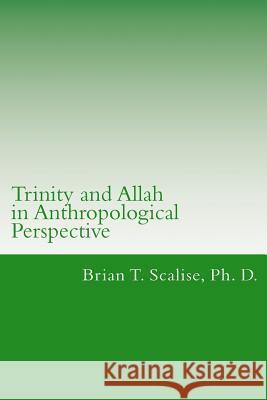Trinity and Allah in Anthropological Perspective: Lecture Notes for Comparing an Islamic Doctrine of Allah with a Christian Doctrine of Trinity » książka
Trinity and Allah in Anthropological Perspective: Lecture Notes for Comparing an Islamic Doctrine of Allah with a Christian Doctrine of Trinity
ISBN-13: 9781502780140 / Angielski / Miękka / 2014 / 72 str.
Trinity and Allah in Anthropological Perspective: Lecture Notes for Comparing an Islamic Doctrine of Allah with a Christian Doctrine of Trinity
ISBN-13: 9781502780140 / Angielski / Miękka / 2014 / 72 str.
(netto: 65,47 VAT: 5%)
Najniższa cena z 30 dni: 67,81
ok. 16-18 dni roboczych.
Darmowa dostawa!
Trinity and Allah in Anthropological Perspective is based on Dr. Scalise dissertation, but packaged in an accessible note format for the purposes of teaching. His dissertation was an investigation into the nature of the Deity in view of human relationships; more specifically, he analyzed whether the Islamic doctrine of Allah or the Christian doctrine of Trinity more readily accounted for certain features of anthropological existence. This work stressed three features: being human means being related, distinct, and in communal oneness. Does the Christian doctrine of Trinity or Islam's doctrine of Tawhidic (monadic) Allah more adequately account for the existence of these anthropological features? Difficult questions emerge from comparing these two theologies proper. Does Islam hold to ex nihilo creation like Christianity? Is there an authoritative center for Islam from which to hear their beliefs clearly? Since Islam does not hold the Imago Dei - except some Sufis - how is humanity to be understood? Since Allah is eternally alone but the Trinity eternal community, what does this mean for humanity? This work is a rich analysis of comparative theologies in view of humanity. Interreligious dialogue is undergirded by clarifying distinctives in both religions' respective theology proper. These notes give a overview of the historical conversation between Christians and Muslims. This conversation has often been apologetic in nature, so some important terms and definitions are laid out to this end. Some major points of commonality and disparity between the two faiths set the framework for the question of humanity. The final and longest section explains the three anthropological features of relatedness, distinctness, and oneness. Then Allah is questioned against these features to determine how or to what extent a doctrine of Allah can ground and explain them. The doctrine of the Trinity follows, and then a strict comparison is performed between Allah and the Trinity in order to clarify which theology has greater explanatory depth and scope for what we humans experiences every day.
Zawartość książki może nie spełniać oczekiwań – reklamacje nie obejmują treści, która mogła nie być redakcyjnie ani merytorycznie opracowana.











